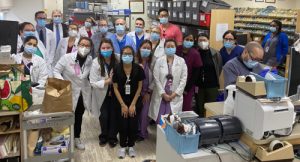
The Montefiore Medical Center pharmacy team is a vital part of the frontline staff working to combat COVID-19 in New York City.
The outbreak of the SARS-CoV-2 virus is disrupting patient care all over the world. In the U.S., many providers have had to adapt to new social distancing measures to care for patients, but struggles remain. Mark J. Sinnett, PharmD, FASHP, director of clinical and educational pharmacy services and director of the Center for Pharmacotherapy Research and Quality (CPRQ) at Montefiore Medical Center, The Bronx, N.Y., recently spoke with The Rheumatologist about how the pandemic is affecting his medical institution. New York is now driving the national pandemic in the U.S., where it’s currently the epicenter of the COVID-19 outbreak.
Q: How are you and your staff adapting to the sudden changes brought about by the pandemic?
As the impact of the COVID-19 pandemic continues to escalate, there has been a huge influx of COVID-19 patients at Montefiore Medical Center. It has required significant changes in staffing for our pharmacists and pharmacy technicians and a new and careful approach to how we dispense medications to these patients. This includes realigning our ambulatory care pharmacists and technicians to our inpatient pharmacy services, storage of medications in a manner that reduces the risk of infection for our pharmacy technicians and use of longer acting medications to reduce coronavirus exposure of our nurses.
In an ironic way, although we practice social distancing and wear PPE [personal protective equipment], this pandemic has brought our staff closer together. We are here for our patients and for each other.
Q: With social distancing, what types of appointments are you conducting? How are you dispensing medicines to patients and counseling them about their medications?
Our ambulatory pharmacy continues to see patients, both our healthcare workers, as well as patients who get discharged from the hospital. Since the outbreak, we limit the number of patients who can enter our pharmacy and counsel patients utilizing social distancing techniques. For patients who were discharged from the hospital with mild disease, we mail medications to them. These patients then do not have to return to the hospital and potentially infect other patients and healthcare workers.
Q: Have you seen any shortages of rheumatology-related drugs, such as hydroxychloroquine (HCQ) or others, that are being investigated as treatments for COVID-19?
Fortunately, we never experienced shortages of HCQ. However, we do experience sporadic shortages of other medications, such as tocilizumab (Actemra), anakinra (Kineret) and sarilumab (Kevzara). We look to enroll eligible patients in these investigational drug protocols whenever possible. Three such studies are randomized, placebo-controlled trials evaluating the efficacy of remdesivir, leronlimab and HCQ against the coronavirus.
The pandemic has also increased the use of potentially effective, but unproved uses of other FDA-approved medications for the management of COVID-19-related complications. The CPRQ will be able to evaluate their effectiveness in both hospitalized and ambulatory patients.
Q: What are you telling patients about COVID-19’s potential risks and symptoms? What are their chief concerns regarding their medications?
Fortunately, there is very good information available regarding the risks of COVID-19, and hence, most patients are aware of what to look for. Patients, however, may not be as knowledgeable about the medications used to manage this infection, including HCQ. We are careful to educate patients about the potential risks and possible benefits, as well as clinically important drug interactions.
Q: How is the pandemic affecting you and your staff personally?
Working in a medical center caring for so many COVID-19 patients, we have been quite stressed and inundated, to say the least. This [situation] is all new to us and came about so rapidly. I believe some of this stress comes more from what we don’t know about the disease. A fear of the unknown can be pretty scary. It also is very hard to see our friends and colleagues get infected. It’s also just as joyous to see them return to us healthy as ever—and we all united and ready to care for our patients on the frontline of this pandemic.
Mary Choy, PharmD, BCGP, FASHP, is a medical writer and editor living in New York City. Dr. Choy is director of pharmacy practice at the New York State Council of Health-System Pharmacists. She is also the author of Healthcare Heroes: The Medical Careers Guide.



